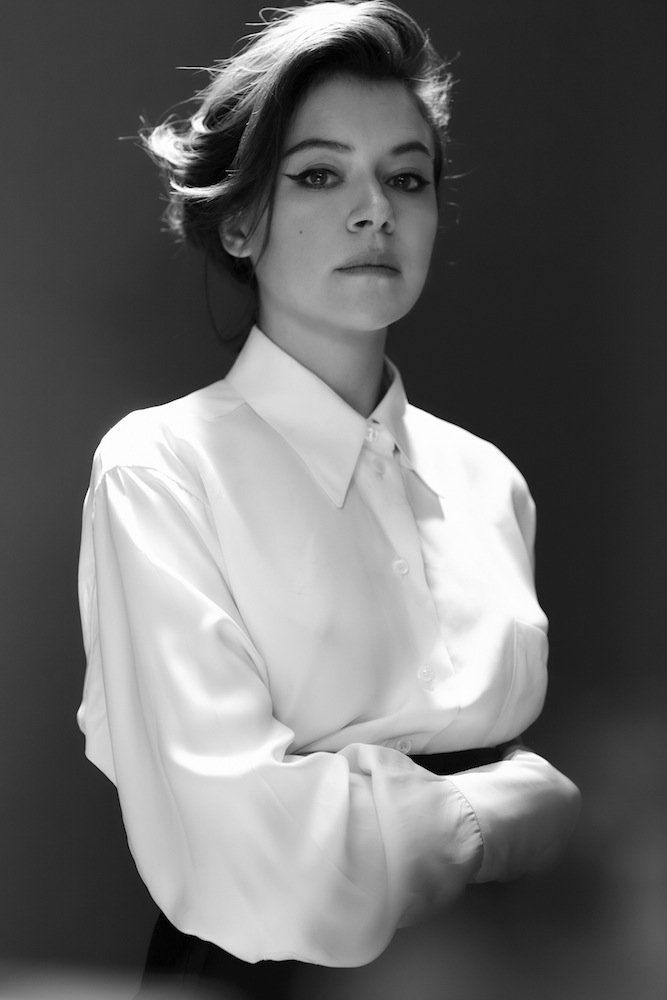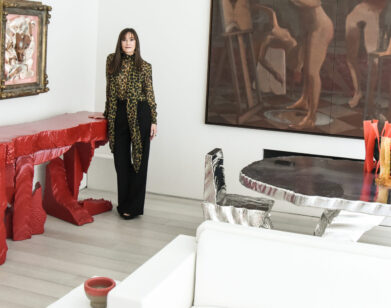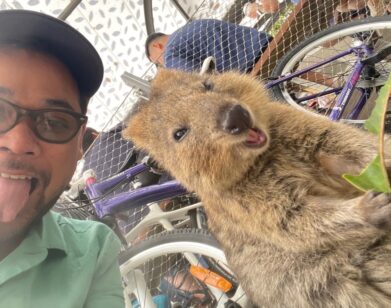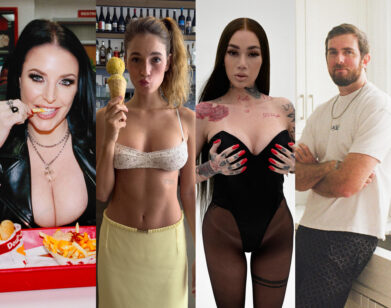Tatiana Maslany, After Clone Club
TATIANA MASLANY IN LOS ANGELES, JUNE 2017. PHOTOS: HARPER SMITH/SEE MANAGEMENT. STYLING: HENNA KOSKINEN/ARTISTS AND COMPANY. HAIR: CHRISTIAN MARC FOR FORWARD ARTISTS USING R+CO. MAKEUP: SANDY GANZER FOR FORWARD ARTISTS USING MILK MAKEUP.
Last month, the ever-twisting Orphan Black began its final season on BBC America. Soon, there will be no more clones—no more Sarah, Alison, Cosima, Rachel, Helena, and seestras—and no more sinister conspiracies to uncover. For die-hard fans of the show—which is, really, anyone who’s watched more that one episode—it’s an equally sad and exciting prospect.
Of particular interest is what Tatiana Maslany, who plays every adult “Leda” clone on the show, will do next. Orphan Black has been a career-defining project for the Canadian actor, who finally won a well-deserved Emmy for her performance last year. She already has several films in the works: come September, she’ll star opposite Jake Gyllenhaal in Stronger, David Gordon Green’s retelling of the 2013 Boston Marathon bombing. Earlier this year, she screened a short, Apart From Everything, at the Palm Springs International Film Festival. Curently, she is working with her boyfriend Tom Cullen on a new collaboration with writer-director Joey Klein.
Here, Maslany talks to another Emmy-winning (and, as of last week, 2017 Emmy-nominated) actor, Orange is the New Black‘s Uzo Aduba.
UZO ADUBA: Where are you right now?
TATIANA MASLANY: I’m in L.A. We just moved here three weeks ago. I’m sitting on the floor in one of our rooms that’s unfinished. Are you in New York?
ADUBA: I am in New York. I’m chilling out because I’m tonight I’m seeing U2 for the first time.
MASLANY: Are you a huge U2 fan?
ADUBA: Huge. I love U2. I just got my wisdom teeth pulled and I look like a chipmunk, but I do not care. That’s how much I love U2. [laughs]
MASLANY: That’s amazing.
ADUBA: I’ll be singing and it’ll be fun. I’m really excited to do this; I’ve never done anything like this before. Before we talk about Orphan Black, I just saw the trailer for Stronger and it looks so good.
MASLANY: That was intense. You’re from Boston right?
ADUBA: Yes. The accents are really good.
MASLANY: Always a contentious point.
ADUBA: For sure. It’s hard to do, but you guys are doing it and it sounds authentic. The movie itself looks really good.
MASLANY: We filmed last spring, kind of around the marathon. I’d never been to Boston before and being in the city at that time—being in the city in general—was a really incredible experience. To be telling that story so soon after it happened… people were so supportive of the film being made and really generous. When we were shooting the actual marathon scene there was this extra, who was an actor, but also a lot of his friends were affected by the tragedy and he was too, just being in the city. We shot that sequence of running over five hours, and he and I were the only ones who kept running the whole time. He just kept running to stay with me, and it was just the most beautiful gesture of commitment to being authentic.
ADUBA: I was in Amsterdam when it happened, and it couldn’t have been a more random place. I was visiting one of my hometown best friends, and we were watching the news and calling up family. I tried to explain that everybody celebrates the marathon in Boston; it’s Patriot’s Day, but everybody calls it “Marathon Monday,” and if you grow up there you know what that day symbolizes. What is it like be working on something that is history? This actually occurred, these people do exist; people are feeling it in a different way. What is it like playing a real person versus say, in Orphan Black where you’re playing all these clones on clones?
MASLANY: It’s a daunting thing to be playing a real person and to have contact with her and meet her and be in her circle a little bit. It’s an odd thing. There’s so much responsibility to tell the story honestly and truthfully, and at the same time, you start to develop a friendship with this person—or I did. I felt a real kinship with her and just her generosity. Erin Hurley, who I play in the movie—who’s boyfriend, Jeff Bauman, lost his legs in the bombing—was running and was a mile out from the very end [when it happened]. I think I still struggle with the concept that I was stepping in her footsteps. I took it extremely seriously, but the way I approached her was not like I was doing an imitation or an impression or a characterization of her, but more so what the conflict was that she was going through. I really focused on what she was going through more than her actual mannerisms because, for me, it wasn’t about that. Have you ever played a real person who you’ve met in real life or read about?
ADUBA: I never played anyone I’ve met. Suzanne [in Orange is the New Black] is a real person that Piper [Kerman] met in prison, but it’s still told through the gaze of Piper. It’s not Suzanne’s account of her life, and I never met with her to be able to get my own personal take on who she is and to inject that into the performance. I like what you said about trying to latch onto the emotional journey of what she was going through at that point rather than do an impersonation of her. Is that typically your style of acting and how you come into characters? In Orphan Black, is that how you find a way into all of these women? When clones are playing other clones in the show, are they doing impersonations?
MASLANY: Those moments are the greatest joy. I get to play with all of the things that we do as people where we see somebody a certain way, we judge somebody, we empathize with something in someone—all of the judgments, good and bad, that we have of people and how that makes us behave. If Sarah is playing Alison, Sarah’s judgments about Alison, the impression that she gets and the impersonation that she does. I like playing with the artifice of it and letting the mistakes and the cracks seep through. When I do those scenes, we’ll do the blocking and the rehearsal and, if I’m Sarah as Alison, I’ll do it in Sarah’s voice with Sarah’s physicality. Once the camera starts rolling, I like to let Sarah play as Alison. It throws us all off. It’s letting that character speak, letting Sarah have all of her judgments about Alison and whatever her physical and emotional experience is, which is really fun to do.
ADUBA: I watch the show and it’s genius, just strictly from the acting of it. Just the order and the ability to organize oneself, to have such a clear identity for each character so that Sarah doesn’t become Alison and Cosima doesn’t become Sarah. It needs to be super clear in the actor’s mind in order for us to get it, which, I think, makes you exceptional. How did you come to find acting? I know you were a ballet dancer when you were younger.
MASLANY: I’ve always loved performing in whatever capacity. From the age of 4, I was in hours of dance class—jazz and ballet—and loved it. I don’t know exactly what drew me to it. I would force my parents to watch me and my brother Daniel perform Jesus Christ Superstar for hours in the living room.
AUBA: No way! Are you serious?
MASLANY: Yeah. [laughs] I think I saw it when I was five.
ADUBA: I could start singing it right now. [laughs]
MASLANY: I would love to hear you do that!
ADUBA: I’m not joking. One of my dream roles is Judas.
MASLANY: How has that not happened? I feel like that’s a no-brainer. [starts singing]
ADUBA: I love that guitar. [makes guitar sounds]
MASLANY: I was playing it for [my boyfriend] Tom [Cullen] the other day in the car. We were driving down the highway, and I was like, “I really need to hear the intro to Jesus Christ Superstar.” He was like, “This is the nerdiest shit on the planet.” But we used to dance around to that and make our parents buy tickets for our performances.
ADUBA: At your house?
MASLANY: At our house, in the living room. We’d cut out little tickets; we already had a business sense about it. We would have so much fun performing and making up dances. It was always part of us,. Then when I was nine, my mom saw this audition, a cattle call for kids to play orphans in Oliver at the local community theater. I auditioned for that and it was my first time singing in public. I got the part of “Orphan #43,” or whatever, and that was the beginning of it. After that, I couldn’t get enough of it. I loved the rush of being on stage and how fun it was to be around kids my age who were all getting to play make-believe and dress up in costumes. When you’re a kid and are able to do that, it’s the most fun. Before I moved to Toronto when I was 20, I’d done movies and been away filming in different provinces in Canada. I was really lucky to have fallen into it, but it was only when I turned 20 and a friend showed me [John] Cassavetes’s films, that I was like, “Oh, shit. This is the possibility for what this art form can be and how it can transport people and transport actors.” I really took a second look at what I was doing, because I had been doing it to get attention and for the rush of performing. It was my career, but I was 9 years old to 20, and who actually knows what their career is at that age? For the last ten years, I’ve been deepening my training. The last class I did was a year ago in New York—Strasberg stuff. That’s my favorite place to be, back in class and studying.
ADUBA: It’s about the learning of the thing. That’s my experience, at least. There’s nothing to be gained other than a deeper knowledge of how to pursue the craft of it.
MASLANY: Have you found anything new since the success of Orange is the New Black and the specific accolades you’ve received? Has that changed your approach to work or the way you feel about it? You’re so fearless in your work and your commitment to your character is massive.
ADUBA: I don’t know if this is going to make me sound more sane or crazy, but when I am working, it is the most alive place for me. That statement feels louder that I intend it to, but that’s the only way I know how to frame it. It’s the safest place I know and definitely the most honest place I know. Maybe it’s that charge that you were talking about when you were a kid. When I’m in that space, that artistic, creative space of making something, I don’t think about anything else. Whether it’s the show or a play, all I’m thinking about is how do I get this person from stop A on this train to stop B? I’m still a person and I have my own life timeline happening simultaneously, [but] I love to act. It’s my safe space. I turn off the noise and shut the door on the world.
MASLANY: That’s amazing, that protectiveness of the work. I totally relate to shutting out the noise. Same as you, I feel the safest, the most vulnerable, and the most excited and alive in work.
ADUBA: We’ve seen each other in real life, and I’ve already gushed about Orphan Black, but I’ll gush again. We don’t get to see often, or often enough, what you do played in the female form. It’s pretty fucking cool. What did you feel about that when you were stepping into those shoes?
MASLANY: I was very excited to read female characters like these. I was excited even at the prospect of playing one of them; I was excited to be in the audition room and to get to play a few of the characters for an hour. I was dreaming, obviously, about getting the part, but just doing the audition was a thrill enough. Just to get to stretch and work like that in an audition space, where usually you do a scene and you’re out. This was four different characters, changing in front of everyone, with the process being outed and without any preciousness. I couldn’t step out of the room and be like, “Give me a moment.” I just walked in with a bag of crap in my hands, and was like, “I’m going to put on these glasses now and play in front of you.”
The response that people have had to the show in terms of the questions of identity and the feminist rhetoric, it was really exciting and sort of a surprise to me. Weirdly, the most I was thinking about gender when I was playing these characters was when John Fawcett, the showrunner, said to me, “I think Alison is the most feminine.” I was like “Okay. What does that mean?” I had this block in my head: “What does that mean that she’s ‘feminine’?” I was watching videos to figure it out. For some reason, the characters defy gender to me in a way: Helena is this Ukrainian serial killer who is now domesticated. Gender wasn’t even a concept to her; she was beyond that almost. My favorite actor on the planet is Gena Rowlands and she plays women who, to me, somehow defy gender. They are women, they are feminine, they are masculine, they are everything. There’s something exciting about that. I don’t know how to articulate it exactly. I guess it’s busting out of the archetypes a little bit and not feeling restricted.
With Suzanne, she encompasses so many things and is such a complex character, did you understand her when you first saw her? What was your thought?
ADUBA: When I first saw her, I understood it as simply a love story: this is someone who is in pursuit of love. That’s what I drafted out of what I read. It’s funny, because you were saying you didn’t think of it so much as identity, and I didn’t think of it as so much as orientation. I knew she was in love with a woman, but that did not factor, somehow, into her expression for me. I’ve seen her now fall in love, or attempt love, with someone else, and it still doesn’t hold firm for me. How we choose to define these terms has always been fascinating and curious to me—where that Webster’s definition came from. I’m currently watching and reading and playing a woman for whom that point feels so inconsequential to the action that is being asked of her. When I started, for me it was just a love story, and what I’ve I learned about her over the years is that she falls hard. She is a lover. If she sets her sight on someone, she is committed and that was what I got out of her. She is in, most times to her detriment. That was the thing I latched onto. We’ve seen her play out love in an intimate way, in a maternal way. She’s not a lover or a fighter; she’s a lover and a fighter. She can be both very easily. Suzanne doesn’t always get it right, but she knows she’s trying to do the best she can with the tools she has to make sense of life, the world, the people who love her, and the people who she feels are attacking the people that she loves.
MASLANY: The way you describe Suzanne is exactly the way I would describe Helena in our show—that lover-fighter thing. She hasn’t necessarily been equipped in a way that everyone deserves to be, but she’s doing the best with what she has and she’s learning constantly. Her heart is opening as well as her capacity to fight; the two are growing at the exact same moment. She flips between wanting to be this very socialized, “normal” person, but her instincts are more base and animal, and she has the capacity for both in her. They are in conflict and are married in her at the same time. It’s so much fun to play a character who carries two contrasting things inside of them, two polar opposite drives or instincts.
ADUBA: Are any of the clones going to die? I’m just asking… [laughs]
MASLANY: So, here’s how it ends…
ADUBA: Let me ask you this question: Would you sign up for it again, having now done it?
MASLANY: I would never want to do a similar thing in terms of television. I don’t know if you’ve ever done a one-woman show, but watching that on stage is my favorite thing on the planet. I’m so drawn to people who can do that and I would love to try it someday. I think that’s the closest that I’d ever get.
ADUBA: That would be so cool. I would love to see you do that.
SEASON FIVE OF ORPHAN BLACK AIRS SATURDAY NIGHTS ON BBC AMERICA. UZO ADUBA IS A SAG AND EMMY AWARD-WINNING ACTOR, WHO CURRENTLY PLAYS SUZANNE WARREN IN NETFLIX’S ORANGE IS THE NEW BLACK.







